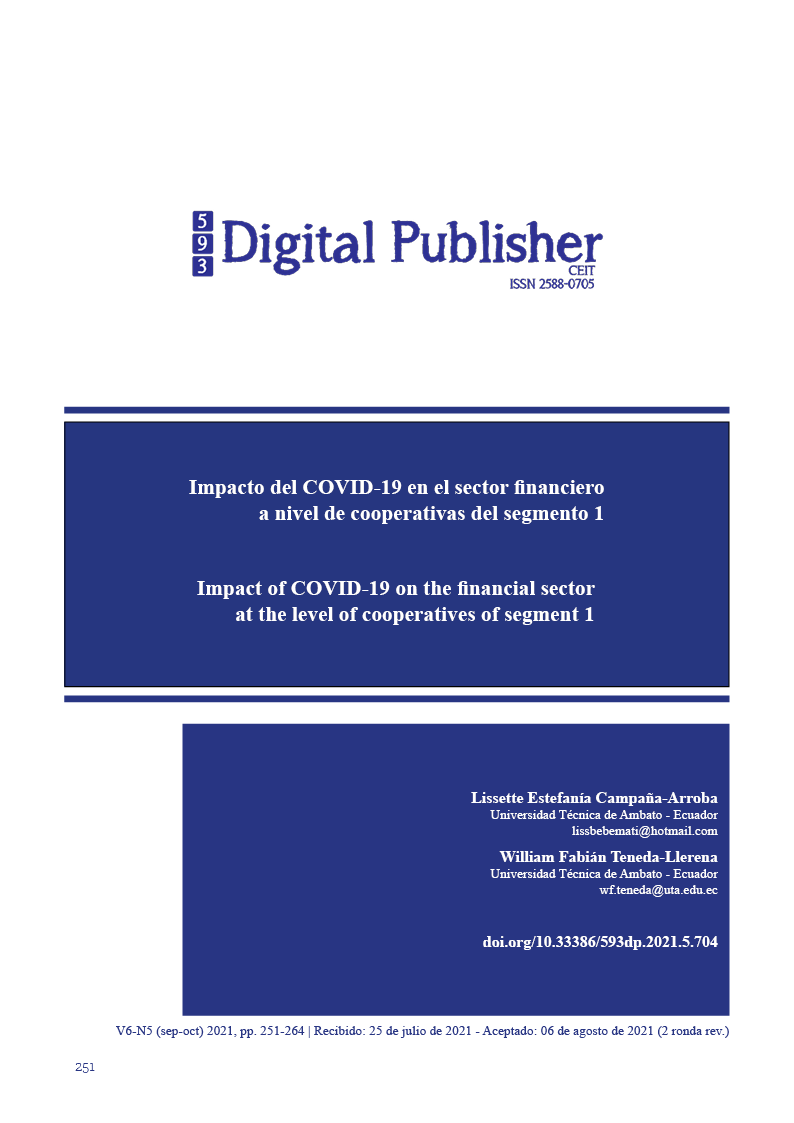Impact of COVID-19 on the financial sector at the level of cooperatives of segment 1
Main Article Content
Abstract
The analysis of the topic: "Impact of COVID-19 in the financial sector at the level of cooperatives of segment 1", aimed to: Determine the socio-economic impact of Covid-19 in the financial sector at the level of cooperatives of segment 1, to that managers make the best decisions. The methodology has a mixed approach, that is, it is quantitative and qualitative, which allows obtaining numerical results and mainly obtaining experience from the study. Correlational research is applied due to its non-experimental typology, bibliographic-documentary research is used and descriptive statistics are applied through the information collection instrument such as: the virtual survey using Google forms, the Cooperatives of Segment 1 were taken as a basis. in their totality there are 36 domiciled in different cities and provinces of Ecuador. In the results, 36% consider that the means used by the financial institution to return the portfolio of its clients in the period of the pandemic was service at the windows; 86% consider that no concessions or refinancing were made during the first months of the pandemic; 61% believe that users partially comply with all the biosafety provisions imposed by the COE; 64% consider the strategy implemented to attract new partners during the COVID-19 pandemic has been to lower interest rates. It is concluded that the portfolio return was minimal, as it was reduced due to the inability of the partners and clients to generate economic income, despite their efforts to maintain the modalities of digital transactions and telephone calls; the economic impact as a result of mobility, production and transportation restrictions led to the suspension of work activities throughout the country for several months, in which citizens could not commit to acquire debts of any kind; the commercial sector turns out to be the most affected, strategic initiatives must be aimed at meeting their needs..
Downloads
Article Details

This work is licensed under a Creative Commons Attribution-NonCommercial-ShareAlike 4.0 International License.
1. Derechos de autor
Las obras que se publican en 593 Digital Publisher CEIT están sujetas a los siguientes términos:
1.1. 593 Digital Publisher CEIT, conserva los derechos patrimoniales (copyright) de las obras publicadas, favorece y permite la reutilización de las mismas bajo la licencia Licencia Creative Commons 4.0 de Reconocimiento-NoComercial-CompartirIgual 4.0, por lo cual se pueden copiar, usar, difundir, transmitir y exponer públicamente, siempre que:
1.1.a. Se cite la autoría y fuente original de su publicación (revista, editorial, URL).
1.1.b. No se usen para fines comerciales u onerosos.
1.1.c. Se mencione la existencia y especificaciones de esta licencia de uso.
References
Aguirre, J. (2015). El papel de la descripción en la investigación cualitativa. Revista de Cinta de Moebio, 15 - 35.
Albella, S, & Hernández, G. (Marzo de 2017). Financiación de las micro, pequeñas y medianas empresas a través de los mercados de capitales en Iberoamérica. Obtenido de https://www.iimv.org/iimv-wp-1-0/resources/uploads/2017/03/estudiocompleto.pdf
Barriga, K. (2020). Las Cooperativas resistieron bien la pandemia. Revista Gestión, 30-36.
Bohoslavsky, J. (2020). Covid-19, instituciones financieras internacionales y continuidad de las políticas androcéntricas en América Latina. Obtenido de Revista Estudos Feministas. vol.28 no.2 Florianópolis. Epub 03-Jul: https://www.scielo.br/scielo.php?script=sci_arttext&pid=S0104-026X2020000200201&lng=es&nrm=iso&tlng=es
Burgos, S. (2020). Ranking Cooperativas. Obtenido de El crecimiento evidenciado: https://www.ekosnegocios.com/articulo/ranking-cooperativas
Capurro, A, Deagosto, G, Ithurralde, S, & Oddone, G. (Mayo de 2020). Impacto Social y Económico de la COVID-19 y Opciones de Políticas. Obtenido de https://www.latinamerica.undp.org/
Castillo, A. (2020). Sectores económicos e impacto Cooperativas de ahorro y crédito. Quito: Superintendencia de la Economía Solidaria.
Castro, C. (2013). Mercadotecnia. México: Editorial Universitaria Potosina.
Equifax. (2020). Data Exclusiva de Equifax, a nivel agregado y proceso de Segmentación para la RFD. Quito: Equifax.
García, K, Prado, E, Salazar, R, & Mendoza, J. (2020). Cooperativas de Ahorro y Crédito del Ecuador y su incidencia en la conformación del Capital Social . Revista Espacios.
González, J, Narváez, C, & Erazo, J. (2020). La gestión de responsabilidad social de las cooperativas de ahorro y crédito de la provincia del Azuay y su retorno financiero. Revista Dominio de las Ciencias, 04 - 33.
Hartaska, V, & Nadolnyak, D. (2020). Do regulated microfinance institutions achieve better sustainability and outreach? Cross-country evidence. Revista Applied Economics, 1207 - 1222.
Hernández, C. (2019). Introducción a los tipos de muestreo. Revista Científica del Instituto Nacional de Salud.
Lafuente, I, & Egoscozábal, A. (2008). Metodologías de la investigación en las ciencias sociales. Revista Escuela de Administración de Negocios, 18.
Ley Orgánica de Economía Popular y Solidaria del Sistema Financiero . (12 de Noviembre de 2019). Ministerio de Inclusión Económica y Social. Obtenido de https://www.economiasolidaria.org/sites/default/files/Ley_de_la_economia_popular_y_s
Leyva, L, & Perez, M. (2018). Google Forms en la evaluación diagnóstica como apoyo en las actividades docentes. Revista Iberoamericana para la Investigación y el Desarrollo Educativo.
Lucero, K. (14 de Abril de 2020). Ecuador frente al COVID 19: Cómo enfrentamos la crisis económica. Revista Gestión Digital.
Mejia, T. (12 de Diciembre de 2019). Investigación correlacional: características, tipos y ejemplos. Obtenido de Lifeder: https://www.lifeder.com/investigacion-correlacional/
Mendez, D. (20 de Octubre de 2018). Econoía Simple. Obtenido de https://www.economiasimple.net/que-son-las-cooperativas-de-credito.html
Méndez, M. (2020). Corresponsables no banacarios en Ecuador. Revista Gestión Económica.
Ordóñez, E. (2020). El sistema financiero en Ecuador. Herramientas innovadoras y nuevos modelos de negocio. Revista Arbitrada Interdisciplinaria KOINONIA.
Pierre, R, & Harris, P. (2020). COVID-19 en América Latina: Retos y Oportunidades. Revista Chilena de Pediatria.
Pierre, R., & Harris, P. (2020). COVID-19 en América Latina: Retos y Oportunidades. Revista Chilena de Pediatria, 50-62.
Quinaluisa, V. (2020). Análisis del Sistema Financiero Ecuatoriano como proceso de formación . Madrid: Repositorio de la Universida de Zaragoza .
Rodas, D. (2020). Radiografía al Sistema Financiero Nacional en época de Corona Virus. Obtenido de https://www.uide.edu.ec/radiografia-al-sistema-financiero-nacional-en-epoca-de-corona-virus/
Rogers, K, & Crosgove, A. (2020). Future Consumer Index: cómo COVID-19 está cambiando los comportamientos del consumidor. Obtenido de https://www.ey.com/es_ec/consumer-products-retail/how-covid-19-could-change-consumer-behavior
SEPS. (2020). Segmentación 2020 de entidades del sector financiero popular y solidario. Obtenido de Estado jurídico. Razón social: https://www.seps.gob.ec/documents/20181/943943/Segmentaci%C3%B3n+2020.pdf/f73c8814-6495-4a07-aba6-465a7631ddfe?version=1.0
Superintendencia de Economía Popular y Solidaria. (2020). Nueva Segmentación Sector Financiero Popular y Solidario. Obtenido de https://www.seps.gob.ec/noticia?nueva-segmentacion-sector-financiero-popular- y-solidario.
Taimal, E. (2020). Informe Sectorial. Ecuador: sector bancario. Revista Scielo .
Torres, A. (2020). Análisis trimestral sectorial. Sectores afectados por COVID-19. Revista Microfinanciero, 18 - 29.
Zabala, V. (15 de Mayo de 2020). Ranking Financiero 2020 el sistema se mantiene sólido y solvente, qué se espera de él tras el efecto COVID-19? Obtenido de https://adnsostenible.com/articulo/ranking-financiero-2020-el-sistema-se-mantiene-solido-y-solvente-que-se-espera-de-el-tras-el-efecto-covid-19
Zabala, V. (15 de Mayo de 2020). Ranking Financiero 2020 el sistema se mantiene sólido y solvente, qué se espera de él tras el efecto COVID-19. Obtenido de https://adnsostenible.com/articulo/ranking-financiero-2020-el-sistema-se-mantiene-solido-y-solvente-que-se-esp



